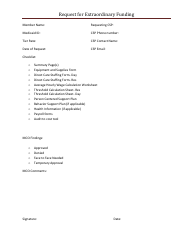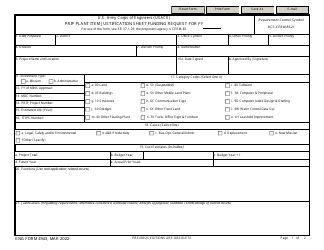Justification for Extraordinary Funding - Kansas
Justification for Extraordinary Funding is a legal document that was released by the Kansas Department for Aging and Disability Services - a government authority operating within Kansas.
FAQ
Q: What is extraordinary funding?
A: Extraordinary funding refers to additional financial support requested by a state in order to address unexpected or exceptional circumstances.
Q: Why would Kansas require extraordinary funding?
A: Kansas may require extraordinary funding to respond to unforeseen events or emergencies that require immediate financial assistance.
Q: What are examples of circumstances that may warrant extraordinary funding?
A: Examples include natural disasters, public health emergencies, severe economic downturns, and large-scale infrastructure projects.
Q: How does Kansas request extraordinary funding?
A: Kansas can submit a formal request to the federal government, providing detailed justifications for the additional financial support needed.
Q: Who makes the decision to approve or deny the request for extraordinary funding?
A: The federal government evaluates the request and makes the final decision on whether to approve or deny the extraordinary funding.
Q: How does extraordinary funding benefit Kansas?
A: Extraordinary funding provides Kansas with the necessary financial resources to overcome unexpected challenges and support the state's recovery and development efforts.
Q: Is extraordinary funding a one-time allocation?
A: Not necessarily. It can be a one-time allocation or provided over a period of time, depending on the specific circumstances and needs of Kansas.
Q: What happens if the request for extraordinary funding is denied?
A: If the request is denied, Kansas may explore alternative funding sources or adjust its plans to address the situation with existing resources.
Q: Is extraordinary funding available for other states as well?
A: Yes, extraordinary funding is available to all states in the United States, provided they meet the necessary criteria and justifications for the additional financial support.
Q: Does extraordinary funding need to be repaid?
A: No, extraordinary funding does not need to be repaid. It is considered a form of federal assistance to help states address exceptional circumstances.
Form Details:
- The latest edition currently provided by the Kansas Department for Aging and Disability Services;
- Ready to use and print;
- Easy to customize;
- Compatible with most PDF-viewing applications;
- Fill out the form in our online filing application.
Download a printable version of the form by clicking the link below or browse more documents and templates provided by the Kansas Department for Aging and Disability Services.






